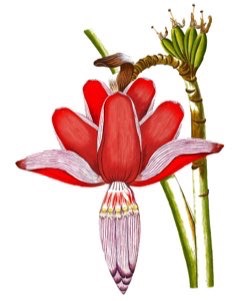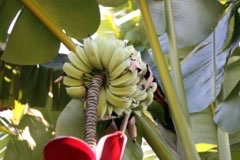 |
|
http://www.edibleplants.org |
 |
| David J. Stang wikimedia.org |
Translate this page:
Summary
Musa balbisiana or commonly known as Plantain is a native to eastern South Asia, northern Southeast Asia, and souther China. It is a perennial plant that reaches a height of around 6 m, with pseudo stems of up to 30 cm in base diameter. The leaves are upright and in clumps. The flowers are red to maroon. The fruits are pale yellow and inedible when raw due to its numerous seeds. It is cooked when ripe. The underground stem can be eaten as a vegetable. The inner stem and male flower clusters are used in curries. The fruit also has medicinal properties but no detailed information was provided. The leaves can be used as food wrapper or as plates. The stem yields fiber and the whole plant yields dye. Plantain can be propagated by division.
Physical Characteristics

 Musa balbisiana is an evergreen Perennial growing to 5 m (16ft) by 3 m (9ft) at a fast rate.
Musa balbisiana is an evergreen Perennial growing to 5 m (16ft) by 3 m (9ft) at a fast rate.
See above for USDA hardiness. It is hardy to UK zone 10. The flowers are pollinated by Birds, Bats.
It is noted for attracting wildlife.
Suitable for: light (sandy), medium (loamy) and heavy (clay) soils and prefers well-drained soil. Suitable pH: mildly acid and neutral soils and can grow in very acid soils.
It can grow in semi-shade (light woodland) or no shade. It prefers moist soil. The plant is not wind tolerant.
UK Hardiness Map
US Hardiness Map
Synonyms
Musa × sapientum pruinosa (King ex Baker) A.M.Cowan & Cowan Musa × sapientum pruinosa King ex Baker
Plant Habitats
Edible Uses
Edible Parts: Flowers Fruit Stem
Edible Uses:
Fruit - raw or cooked[418 ]. The fruit is not often eaten raw, being unpopular because of its seediness[301 ]. The ripe fruit is boiled, baked, fried, or roasted[418 ]. Juice from the ripe fruits is mixed with sugar and then fermented into a type of vinegar[301 , 418 ]. Young fruits are used like green papaya in salads and pickles[301 ]. The green, yellow or brown fruits can be 10 - 25cm long. They can be seeded or seedless[418 ]. The underground stem can be eaten as a vegetable[418 ]. The inner stem is sometimes eaten in curries[301 ]. Male flower clusters - sometimes used as an ingredient in curries[301 ].
References More on Edible Uses
Medicinal Uses
Plants For A Future can not take any responsibility for any adverse effects from the use of plants. Always seek advice from a professional before using a plant medicinally.
Miscellany
The fruit has medicinal properties[418 ].
References More on Medicinal Uses
The Bookshop: Edible Plant Books
Our Latest books on Perennial Plants For Food Forests and Permaculture Gardens in paperback or digital formats.

Edible Tropical Plants
Food Forest Plants for Hotter Conditions: 250+ Plants For Tropical Food Forests & Permaculture Gardens.
More

Edible Temperate Plants
Plants for Your Food Forest: 500 Plants for Temperate Food Forests & Permaculture Gardens.
More

More Books
PFAF have eight books available in paperback and digital formats. Browse the shop for more information.
Shop Now
Other Uses
Containers Dye Fibre Miscellany
Other Uses The leaves are used for wrapping foods, for cooking and as plates[301 , 418 ]. Fibres can be obtained from the stem[317 ]. The plant yields a dye[317 ].
Special Uses
Food Forest
References More on Other Uses
Cultivation details
A plant of the humid tropics, where it is found at elevations up to 1,200 metres. It grows best in areas where annual daytime temperatures are within the range 23 - 28°c, but can tolerate 16 - 38°c[418 ]. Mature growth can be killed by temperatures of 8°c or lower, whilst young growth can be killed at 12°c[418 ]. It prefers a mean annual rainfall in the range 1,300 - 3,000mm, but tolerates 1,000 - 5,000mm[418 ]. Prefers a position in full sun or light shade[418 ]. Succeeds in most moderate to fertile soils that are well-drained[418 ]. Requires a position sheltered from strong winds[418 ]. Prefers a pH in the range 5.5 - 7, tolerating 4.5 - 7.5[418 ]. Flowering Time: Mid Summer Late Summer/Early Fall. Bloom Color: Fuchsia (Red-Purple). Spacing: 36-48 in. (90-120 cm) 4-6 ft. (1.2-1.8 m) 6-8 ft. (1.8-2.4 m).
References Carbon Farming Information and Carbon Sequestration Information
Temperature Converter
Type a value in the Celsius field to convert the value to Fahrenheit:
Fahrenheit:
The PFAF Bookshop
Plants For A Future have a number of books available in paperback and digital form. Book titles include Edible Plants, Edible Perennials, Edible Trees,Edible Shrubs, Woodland Gardening, and Temperate Food Forest Plants. Our new book is Food Forest Plants For Hotter Conditions (Tropical and Sub-Tropical).
Shop Now
Plant Propagation
Seed -
Other Names
If available other names are mentioned here
Plantain, Plantain Banana, Aatha kala, Athia kol, Athiya kol, Bhim thalit, Bicha kala, Bonkera, Chang-el, Chungbi anguoba, Kait dewsan, Kluai taanee, Sau-su-sheth, Wegoin, eti kesel.
Native Range
TEMPERATE ASIA: Guangdong Sheng, Guangxi Zhuangzu Zizhiqu, Yunnan Sheng (west),China. TROPICAL ASIA: India (northeast), Sri Lanka, Nepal, Papua New Guinea, India, Andaman and Nicobar Islands, Myanmar, Thailand, Indonesia, Jawa, Malaysia, Philippines,
Weed Potential
Right plant wrong place. We are currently updating this section.
Please note that a plant may be invasive in one area but may not in your area so it's worth checking.
Conservation Status
IUCN Red List of Threatened Plants Status : This taxon has not yet been assessed

Growth: S = slow M = medium F = fast. Soil: L = light (sandy) M = medium H = heavy (clay). pH: A = acid N = neutral B = basic (alkaline). Shade: F = full shade S = semi-shade N = no shade. Moisture: D = dry M = Moist We = wet Wa = water.
Now available:
Food Forest Plants for Mediterranean Conditions
350+ Perennial Plants For Mediterranean and Drier Food Forests and Permaculture Gardens.
[Paperback and eBook]
This is the third in Plants For A Future's series of plant guides for food forests tailored to
specific climate zones. Following volumes on temperate and tropical ecosystems, this book focuses
on species suited to Mediterranean conditions—regions with hot, dry summers and cool, wet winters,
often facing the added challenge of climate change.
Read More
Expert comment
Author
Colla
Botanical References
Links / References
For a list of references used on this page please go here
A special thanks to Ken Fern for some of the information used on this page.
Readers comment
| Add a comment |
|
If you have important information about this plant that may help other users please add a comment or link below. Only comments or links that are felt to be directly relevant to a plant will be included. If you think a comment/link or information contained on this page is inaccurate or misleading we would welcome your feedback at [email protected]. If you have questions about a plant please use the Forum on this website as we do not have the resources to answer questions ourselves.
* Please note: the comments by website users are not necessarily those held by PFAF and may give misleading or inaccurate information.
To leave a comment please Register or login here All comments need to be approved so will not appear immediately.
|
Subject : Musa balbisiana
|
|
|
|